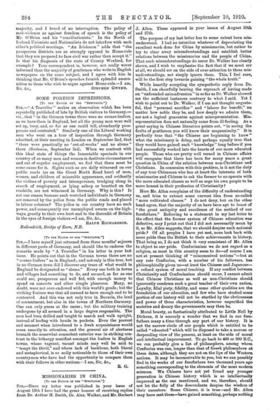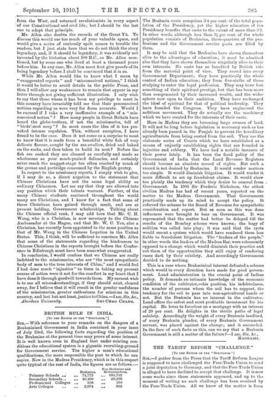MISSIONARIES IN CHINA.
[TO THE EDITOR OF THE " SPECTATOR."]
SIE,—Since my letter was published in your issue of August 13th I have had the great honour of receiving replies from Dr. Arthur H. Smith, Dr. Alex. Walker, and Mr. Herbert J. Allen. These appeared in your issues of August 20th and 27th.
The purpose of my last letter has to some extent been mis. understood. I had no intention whatever of depreciating the excellent work done for China by missionaries, but rather to try to clear away misunderstandings and establish better relations between the missionaries and the people of China.
That such misunderstandings do occur Dr. Walker has clearly shown, and I wish to emphasise the fact that if we must err at all, we should err on the side of over-attention to these mis- understandings, not simply ignore them. This, I feel sure, will be the first step towards gaining " the whole truth."
While heartily accepting the sympathetic reply from Dr. Smith, I am cheerfully bearing the reproach of having made an "unfounded animadversion " in so far as Dr. Walker showed me the sufficient instances contrary to what I said. Yet I wish to point out to Dr. Walker, if I am not thought ungrate- ful, that "personal sacrifice" and "labour for benefit," no matter how noble they be, and how deeply we admire them, are not a logical guarantee against misrepresentation. Mis- representation does not naturally come from ill-feeling. As a great saying in Chinese literature points out, " in seeing the faults of gentlemen you will know their magnanimity." It is perfectly true that " the Chinese are beginning to know " what the missionary is doing, and perhaps equally true that they would have gained such " knowledge " long before if you had successfully worked into the hearts of our more educated people. Those who are pretty well versed in Chinese affairs will recognise that there has been for many years a great question in China of the relation between non-Christians and Christians. In connexion with this problem, is it not the duty of any true Chinaman who has at heart the interests of both missionaries and Chinese to ask the former to co-operate with the more educated classes as well as urge his own people to be more honest in their profession of Christianity ?
Here Mr. Allen complains of the difficulty of understanding us, and tries to extract some current idea from so-called " more cultivated classes." I do not deny, but on the other hand agree, that the majority of us have been apt to boast of " the great antiquity and excellence of the method of oar forefathers." Referring to a statement in my last letter to the effect that the former system of Chinese education was defective, may I point out that I did not necessarily mean by it, as Mr. Allen suggests, that we should despise such national pride ? Of all peoples I have yet met, none look back with more pride than the British to their achievements in history.
That being so, I do not think it very consistent of Mr. Allen to object to our pride. Confucianism we do not regard as a religion, as most in this country seem to do—of course I am not at present thinking of " misconceived notions "—but at
any rate Confucius, with a number of his followers, has philosophically given us—at least the Chinese and Japanese—
a refined system of moral teaching. If any conflict between Christianity and Confucianism should occur, I cannot admit that Chinese Christians as well as non-Christians should ignorantly condemn such a great teacher of their own nation.
Loyalty, filial piety, fidelity, and some other qualities are the foundation of our education, and few who have studied some portion of our history will not be startled by the obviousness and power of these characteristics, however unpurified the societies and dreary the governments may then be.
Moral beauty, as fantastically attributed to Little Nell by Dickens, it is scarcely a wonder that we find in our fore- fathers many a time through any part of our history. It is not the narrow circle of our people which is entitled to be called "educated" which will be disposed to take a morose or desponding view of the present, at least on the side of moral and intellectual improvement. To go back to 400 or 300 B.C., we can probably give a list of philosophers, among whom Confucius was one, longer than that of Greek philosophers at these dates, although they are not on the lips of the Western nations. It may be inconceivable to you, but we can possibly find in the works of our forefathers two thousand years ago
something corresponding to the elements of the most modern sciences. We Chinese have not yet found any younger
generation in Chinese history which is so intellectually improved as the one mentioned, and we, therefore, should not let the folly of the descendants despise the wisdom of their ancestors: Some Chinese, it is true—and Mr. Allen may have met them—have gained something, perhaps nothing from the West, and returned revolutionists in every aspect of our Constitutional and civil life ; but I should be the last one to adopt that principle.
,Mr. Allen also doubts the records of the Great Yii. To discuss this would use too much of your valuable space, and would give a series of curiously spelt names to trouble the readers, but I just state here that we do not think the story legendary, and, if it should be legendary, it was evidently not invented by the historian about 100 B.C., as Mr. Allen men- tioned, but by some one who lived at least a thousand years before him. In any case, Mr. Allen must first give proofs of its being legendary before I shall be convinced that it is so.
While Mr. Allen would like to know what I mean by " exaggerated reports " and " misconceived notions," I think it would be better to avoid details in the public Press, and thus I will allow any weaknesses to remain that appear in my letter through not giving sufficient illustration. I only wish. to say that those whom it has been my privilege to meet in this country have invariably told me that their preconceived notions regarding us were very far from accurate. Would I be excused if I take a very inoffensive example of a " mis- conceived notion" P How many people in Great Britain have heard the globe-trotters, if not the missionaries, tell of " birds'-nest soup " P In most cases the idea of it has pro- voked intense repulsion. This, without exception, I have found to be the case. Does it not come as a surprise to most to know that it is made from a beautiful white fish of very delicate flavour, caught by the sea-swallow, dried and baked on the rocks, and then taken to build its nest P Before the fish are cooked they are cleaned as carefully and made as -wholesome as your much-praised delicacies, and certainly never reach the maggot-stage too often reached by much of the grouse and partridge consumed by the English gentry.
In respect to the missionary reports, I simply wish to give, if I may do so, a direct negation to the statement that Chinese Christians have not the same legal ability as ordinary Chinamen. Let me say that they are allowed into any position which their talents warrant. Further, of the many Chinese students scattered throughout the world many are Christians, and I know for a fact that some of these Christians have gained through merit, and are at present holding, Government scholarships. Talking about the Chinese official rank, I may add here that Mr. C. H. Wang, who is a Christian, is now secretary to the Chinese AMbassador at the Hague, and that Mr. W. C. Yen, also a Christian, has recently been appointed to the same position as that of Mr. Wang in the Chinese Legation in the United States. This, I think, will be sufficient to convince Mr. Allen that some of the statements regarding the hindrances to Chinese Christians in the reports brought before the Confer. ence in Edinburgh must have been somewhat exaggerated.
In conclusion, I would confess that we Chinese are really indebted to the missionaries, who are "the most sympathetic body of men to the true interests of China," and I would feel I had done much " injustice " to them in taking my present course of action were it not for the comfort in my heart that I have done it through goodwill towards them. My earnest wish is to see all misunderstandings, if they should exist, cleared away, for I believe that it will result in the greater usefulness of the missionaries, greater enthusiasm for missions in this country, and last but not least, justice to China.—Iam, Sir, &c.,







































 Previous page
Previous page